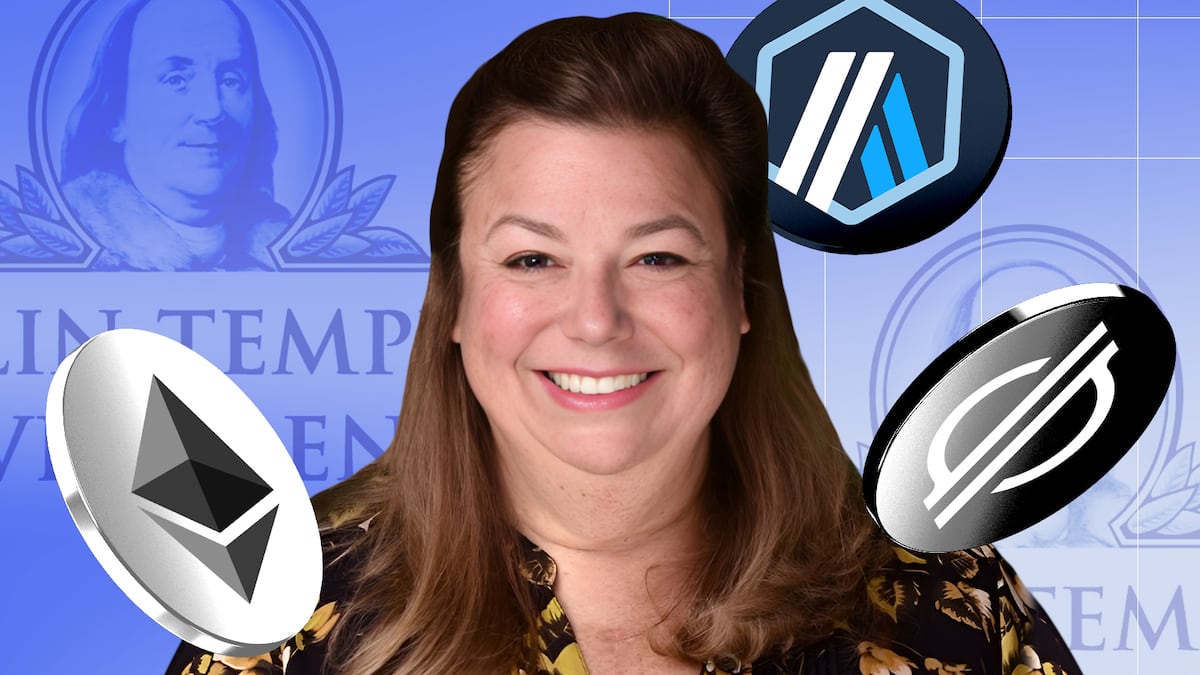- Franklin Templeton launched its tokenised fund in 2021.
- Blockchain will play key role in the firm's growth strategy.
- Still, regulatory hurdles are stunting growth.
Franklin Templeton was the first asset management firm to tokenise a fund.
Now, it’s positioning blockchain at the core of its business.
Since launching the industry’s first-ever tokenised fund in 2021, the firm’s head of innovation says digital assets will play a key role in the $1.5 trillion asset manager’s growth strategy over the next decade.
“Big, public blockchains are going to become the ledgers for the world and global utilities within the next 10 years,” Sandy Kaul, Franklin Templeton’s head of innovation, told DL News in an exclusive interview. “There’s a tremendous amount of opportunity here.”
Equity and bond funds
The firm’s push is part of a strategy to broaden its client base beyond vanilla equity and bond funds, and to increasingly tap alternative assets, including private credit, real estate, and crypto offerings.
Kaul’s comments come as Wall Street increasingly eyes tokenisation as a promising business opportunity.
Ripple, the crypto company, and Boston Consulting Group, the consultancy, estimate that the entire tokenised asset market could skyrocket almost 8,000% to be worth $19 trillion by 2033.
Franklin Templeton may benefit from a head start.
Under the stewardship of CEO Jenny Johnson, the company kicked off its crypto experimentation four years ago.
The firm first entered the crypto industry by launching a tokenised version of its $5 billion Government Money Fund, called FOBXX, on Stellar Lumens and became the first asset manager to do so.
‘That capital will be freed up if I can settle that transaction immediately.’
— Sandy Kaul
The fund now exists on Ethereum, Arbitrum, Base, and a host of other blockchains, which has led to more experimentation.
“Then we built our node operations, and we started getting rewards for being a node operator, and we started staking,” said Kaul. “We suddenly realised there is so much value being created here.”
In June, Franklin Templeton launched a new yield feature for its fund that lets holders earn yield for every second they hold FOBXX. Typically, the yield for a traditional fund is distributed to the holder at the end of the market close.
Unlike yield earned on traditional funds, which is distributed at the end of the month, the crypto-powered yield feature distributes the money at the end of each day.
Kaul expects this to be a key selling point for large corporate treasuries.
“If I’m putting billions of dollars in and taking it out in the same day, and I lose all that yield, that’s a significant amount of money,” said Kaul.
Rivals
Franklin Templeton’s competitors aren’t resting on their laurels, however.
BlackRock, VanEck, Fidelity, Guggenheim, and Wisdom Tree have also launched similar tokenised funds over the years.
The tokenisation trend, the process of putting stocks and bonds on a blockchain, has also caught the attention of fintech stalwarts such as Robinhood.
On Monday, the company’s CEO, Vlad Tenev, unveiled a new tokenised stock offering to a captive audience during an industry event in Cannes, France.
“It has the potential to become the backbone of the global financial system,” he said.
Kraken and Bybit also launched similar services this week.
Kaul said the key advantage of blockchain becoming more embedded in finance will be the efficiencies gained around settlement.
While waiting for an investor’s purchase of a stock to settle, which can take up to two days to clear, brokers must put up collateral during that period in case the buyer or seller fails to deliver the cash or securities.
Tokenisation’s key promise is that this collateral will no longer be necessary as settlement times become instant on a blockchain.
“I’m tying up a lot of capital to guard against operational risks in today’s system, that capital will be freed up if I can settle that transaction immediately,” Kaul said.
Long road ahead
For all its promises, however, tokenisation still has a very long way to go.
Franklin Templeton’s fund has raked in nearly $800 million in investment across 661 different wallet addresses, according to data from rwa.xyz. That makes it the second-largest tokenised treasury fund on the market after BlackRock.
But these figures pale in comparison to traditional capital markets.
Regulatory hurdle
The entire tokenisation market – stocks, funds, private credit, and government debt – is worth $24 billion. The global public stock market alone was valued at nearly $115 trillion in 2023, according to a World Economic Forum report.
Kaul chalks up this drag to a regulatory hurdle.
“We’re waiting for the regulations to clarify how we can list our regulated products on crypto exchanges,” she said, adding that after that, it’s simply a matter of engaging market makers to drum up liquidity around these products.
And after that?
“That’s when you’ll start to see wholesale tokenisation.”
Liam Kelly is a Berlin-based reporter for DL News. Got a tip? Email him at liam@dlnews.com.


